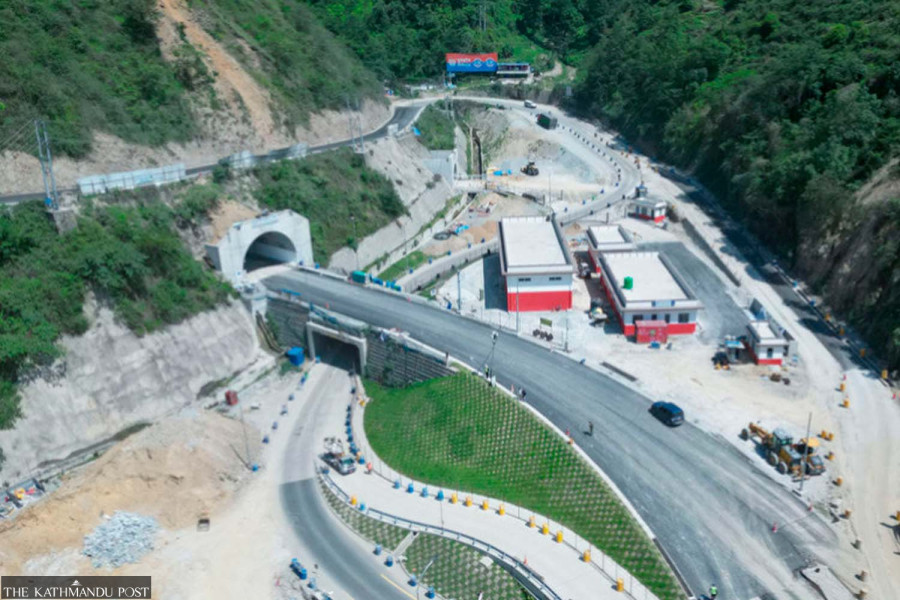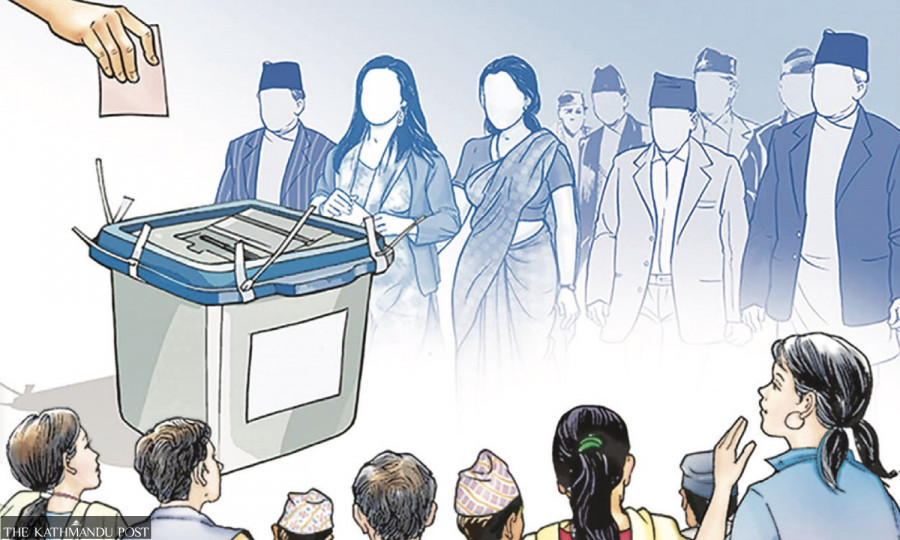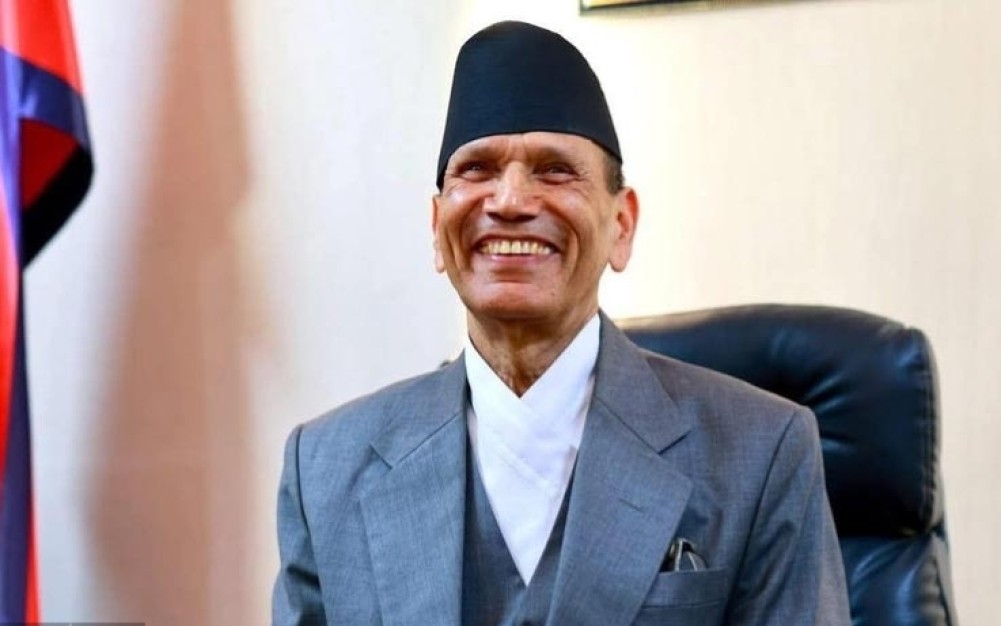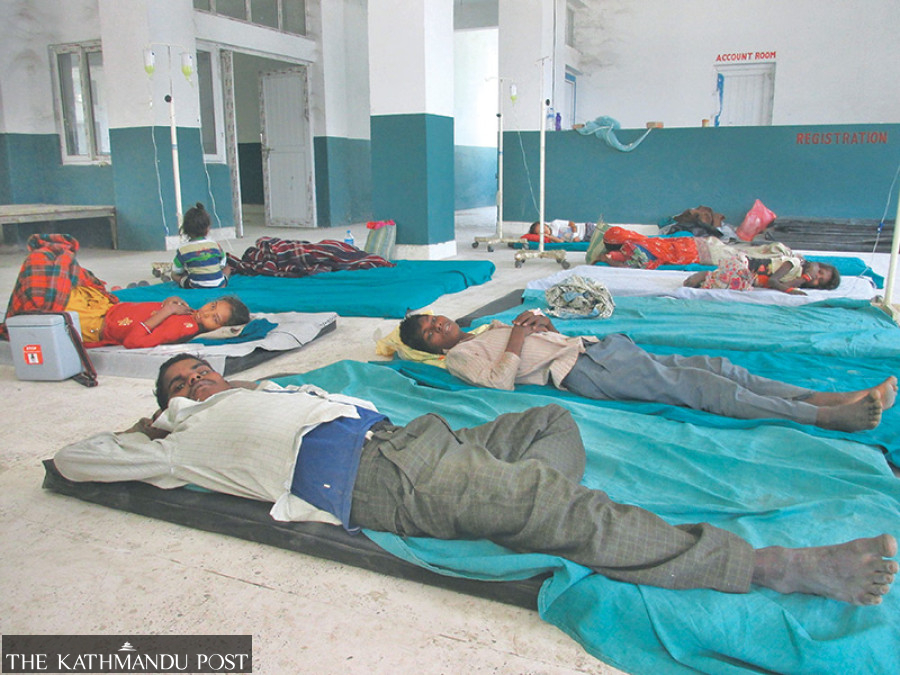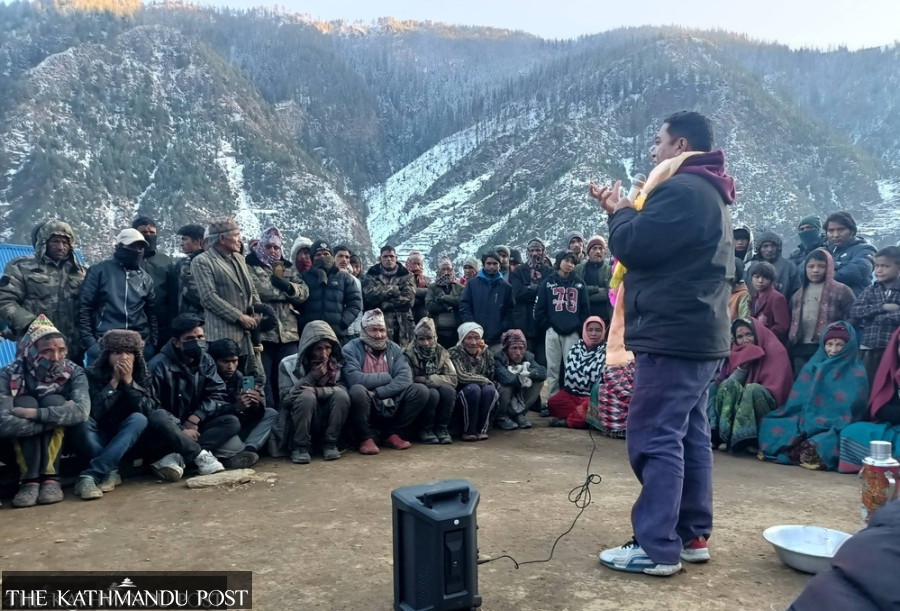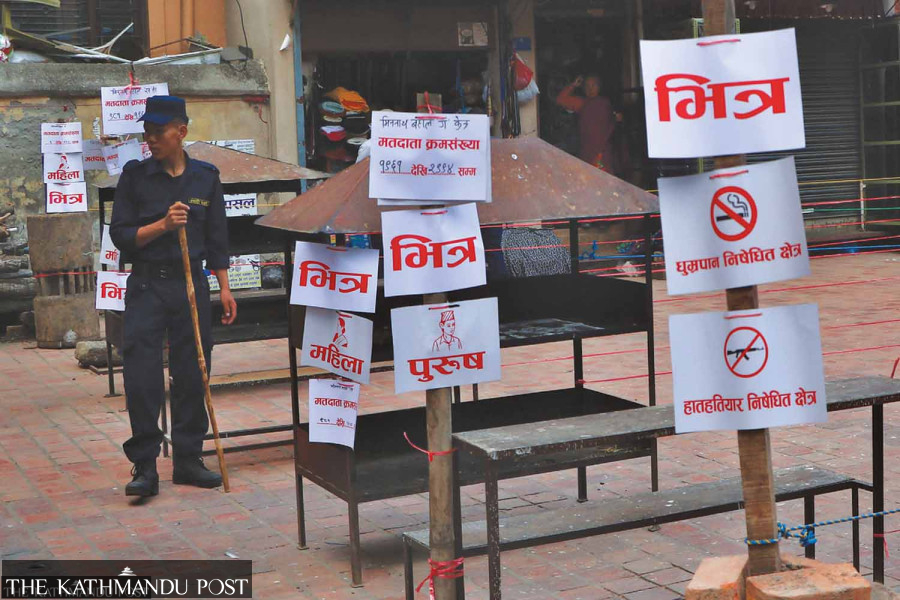National
Many Nepalis hope to reach Europe. But their dreams end in Libya.
Despite a high rejection rate, Nepalis continue to apply for asylum in Europe in large numbers, often choosing perilous paths through the North African country to cross into Europe.
Bhrikuti Rai & Chandan Kumar Mandal
Santosh Shrestha was supposed to return home to Nepal.
In January, Shrestha left Lamjung in the hopes of reaching Italy. An agent had promised to get him across the Mediterranean but was unable to take him beyond the borders of Libya, where security conditions have been fragile for years, with fresh violence escalating since earlier this year. After spending nearly six months in the country, uncertain of ever reaching Italian shores, 27-year-old Shrestha reached out to the International Organization for Migration to help him return to Nepal.
But on July 3, just days before Shrestha was supposed to leave Libya, an airstrike hit a detention centre outside Tripoli, where he was living with dozens of other migrants. He was the only Nepali there and was among the 53 people killed by the air strike.
“Why was my son kept at the detention centre?” Som Prasad, Shrestha’s father, asked after learning of his son’s death. “Why didn’t they let him return like the others did?” Som Prasad, a school principal in Lamjung, spoke to the Post three days after his son was killed in Libya.
Shrestha is the first Nepali to die in the ongoing violence in Libya. But he isn’t the only Nepali to be caught in the midst of renewed civil war, more than 6,000 kilometres away from home. In the last two years, dozens of Nepalis have ended up in the North African country, hoping to cross the Mediterranean Sea to reach European shores. According to the Libyan office of IOM, since 2018, they have helped send back 48 Nepalis stranded in Libya.
But there are also hundreds of Nepalis who risk the perilous journey across the sea and apply for asylum in Europe. According to the European Asylum Support Office, these numbers have “remained broadly stable”, ranging between 580 and 830 applications per year since 2015, despite Nepalis having low recognition rates when it comes to being granted refugee status or given subsidiary protection after filing for asylum. In April 2019, the recognition rate was just 6 percent.
“The low recognition rate indicates that very few Nepali applicants are found to have valid grounds to be given international protection,” Anis Cassar, spokesperson for the European Asylum Support Office, told the Post.
Despite that, last year alone 805 Nepalis applied for asylum in different European countries. A majority of these applications were filed in countries like Cyprus, Italy, Greece and France, which border the Mediterranean.
Shrestha had paid Rs 1 million to a human trafficker to get to Libya, and when he last spoke to his parents several weeks before his death, he had asked for an additional Rs 200,000 to get to Italy. If he had managed to get to European shores, or survived the air strike, he would have been part of a different kind of statistic.
***

When Sanjay Adhikari and Dilip BK from Madi, Chitwan left for Libya last year, they knew almost nothing about the North African country, including the ongoing violence there. They had never heard of Libya, let alone how far it is from Nepal.
Oil-rich Libya has been torn by violence and division since the uprising against—and subsequent fall of—its leader Muammar Gaddafi in 2011. The country has remained a battleground between warring militias and political factions, which has displaced thousands of Libyans. Since April 2019, military commander Khalifa Haftar’s Libya National Army has been battling rival militias in a bid to control the capital of Tripoli from Libya's internationally recognised Government of National Accord, leading to intensified fighting in and around the capital.
In recent years, the number of people from the Middle East and South Asia crossing the Mediterranean from Libya into southern Europe has increased, following the war against ISIS in Syria and Iraq and the continuing crisis in Afghanistan. To control the record number of people showing up at its borders, the European Union has been providing support to the Libyan Coast Guard, which intercepts migrants and asylum seekers at sea before taking them back to Libya for arbitrary detention.
But Adhikari and BK didn’t bother learning anything about Libya, because they were told that the money they would make would be a lot: Rs 50,000 every month—about $500. And more importantly, the cost of going there was relatively cheap—Rs 400,000—compared to the cost of reaching other countries that would offer that kind of salary.
“We did not even know there was a country called Libya until we heard about the job opportunities there through an agent,” said 24-year-old Adhikari, who returned from Tripoli on July 5, two days after Shrestha was killed in the air strike.
“The only plan was to earn money, good money, which we were promised. They told us that the country is peaceful,” said Adhikari.
BK, who had returned from Qatar a year before he left for Libya, shared the same aspiration. Unemployed and living at home for more than six months, BK couldn’t resist the offer to leave Nepal again.
“A person in Libya told us that there were good jobs available, the country is peaceful and that we can make good money,” BK told the Post during an interview in Kathmandu earlier this week.
Like Adhikari, 28-year-old BK was convinced because the manpower agent had told them that his relatives and friends were also heading for Libya. More importantly, the investment was low, compared to the millions of rupees some Nepalis have been paying to reach the US.
“We thought, why not grab the opportunity?” said BK.
Adhikari and BK paid Rs 400,000 each for the Libyan job to associates of Ram Chandra Ghimire, who was masterminding the whole operation from Libya via phone and messenger services, according to the two men.
After making their payments, both Adhikari and BK flew to Dubai on a tourist visa. However, their plans of reaching Libya stalled in the Middle Eastern country. They were told to wait in Dubai for two months. Although they don’t know why they were asked to wait, they believe that the local agent was probably working on arrangements for their entry into Libya. After a two-month wait, they were finally taken to Libya via Tunisia, after paying another Rs 100,000 to a local agent in Dubai.
Adhikari and BK lived out of a room for a week in Gharyan, a city in northwest Libya. They had been promised a job in a biscuit factory or a confectionery company, but when they were told what their jobs were actually going to be, all their hopes of working a comfortable job and making a good income evaporated.
“We were given jobs at a construction company in Gharyan. An employment agency sent us there,” said BK. “We had to carry construction materials, cut iron rods and do welding. The job was tougher than we had imagined.”
%20copy.jpg)
The two men weren’t told the name of the company and they couldn’t figure it out for themselves as there were no signs. All around them, they could hear gunshots, bombs going off, and rising smoke in the distance. They were not allowed to leave the construction site for seven months, which they spent with three other Nepalis.
“The place was scary. We never thought we’d return home to Nepal alive,” Adhikari said.
Adhikari and BK were paid around $300 a month, even though the trafficking agent had promised them $500. Food was provided by the company, but the employer would take his cut. They spent nearly $100 a month on food and personal expenses.
“The food was so horrible that we could not swallow it. We were earning less than what we had been promised and we had to spend money on food as well,” BK said. “We had no bank account. So the employer would pay us cash in dollars. But, each month, we never knew how much it would be.”
After seven months of living in constant fear, Adhikari and BK decided to leave. Desperate to leave their captive-like conditions as their movement outside the workplace was restricted, they looked for support. They came across a video on YouTube which explained how other Nepalis stranded in Libya had reached out to the UN Peacekeeping Mission in Tripoli and had been rescued.
“We made calls to them [the UN office] and asked them to rescue us,” said BK. “We asked them to take us away from there before we died.”
Adhikari, BK and three other Nepalis were finally rescued in June and taken to the IOM camp in Tripoli. They lived there for a month before being repatriated back to Nepal in the first week of July, with six others.
“I often thought that I would never return to my family,” BK told the Post during a trip to the Anti Human Trafficking Bureau in Kathmandu last week. “It was only when the IOM team came to our rescue that I began to hope that I would live and return home safely.”
Among those who returned from Libya, only Adhikari and BK have approached the police to register a complaint about how they were deceived. But they aren’t very hopeful about the police’s intervention. They don’t have any evidence to show to the police since both men paid cash to agents here in Nepal and in Dubai.
“All we have are our Facebook messenger conversations with Ghimire,” said BK.
The Anti-Trafficking Bureau has recorded a rise in cases of Nepali citizens being duped into going to Libya, either by promising lucrative jobs or as a pitstop on the way to European countries, according to Superintendent of Police Anupam Shumsher Rana.
Last February, 12 Nepalis who were en route to Italy were held hostage in Libya. They were held captive by agents who had lured them with promises of well-paying jobs in Europe after collecting hefty payments of around Rs 1.3 million for passage to Italy. When they landed in Italy, they would have to pay another Rs 1.3 million, according to police. The situation only came to light when some of their family members approached the police in Nepal after the agents forced the workers to demand money from home. Two Nepali trafficking agents were subsequently arrested by the Central Investigation Bureau.
In June, the police arrested Lokman Rai, described as the ‘human trafficking kingpin,’ in Kathmandu. Rai is the alleged mastermind behind a human trafficking ring that sends Nepalis to Libya and to European countries. He was arrested after complaints from 15 Nepalis who were rescued from Libya in May, with support from Nepali peacekeeping troops in the North African country and the IOM.
“Our investigations of recent cases have shown that most Nepalis enter Libya with the intention of reaching Italy,” Rana, at the anti-trafficking bureau, told the Post. “However, there are a few who have migrated for jobs in Libya itself.”
According to Rana, most Nepalis pay between Rs 400,000 and Rs 500,000 to human trafficking agents before they even reach Libya. But Rana said that some blame for their situations must rest with Nepalis who choose to go to countries like Libya despite knowing the risks.
“Most of these people choose to go to Libya knowingly,” he said. “They have mentally prepared themselves for the journey and have mapped everything out. They want to reach Libya and then go to European countries irrespective of the problems they face en route.”
Another problem the bureau faces while investigating such cases, according to Rana, is a lack of evidence. Most of the time, victims cannot produce evidence in the form of documents and the accused do not provide any details about their racket.
“Victims do not have any electronic transactions or documents for the payments made. When they are repatriated back by agencies like the IOM, all they have is a story,” Rana said. “We know that these people have been victims of human trafficking. A person files a complaint against another person. Based on their experience and moral ground, we investigate, but the court needs solid evidence.”
***
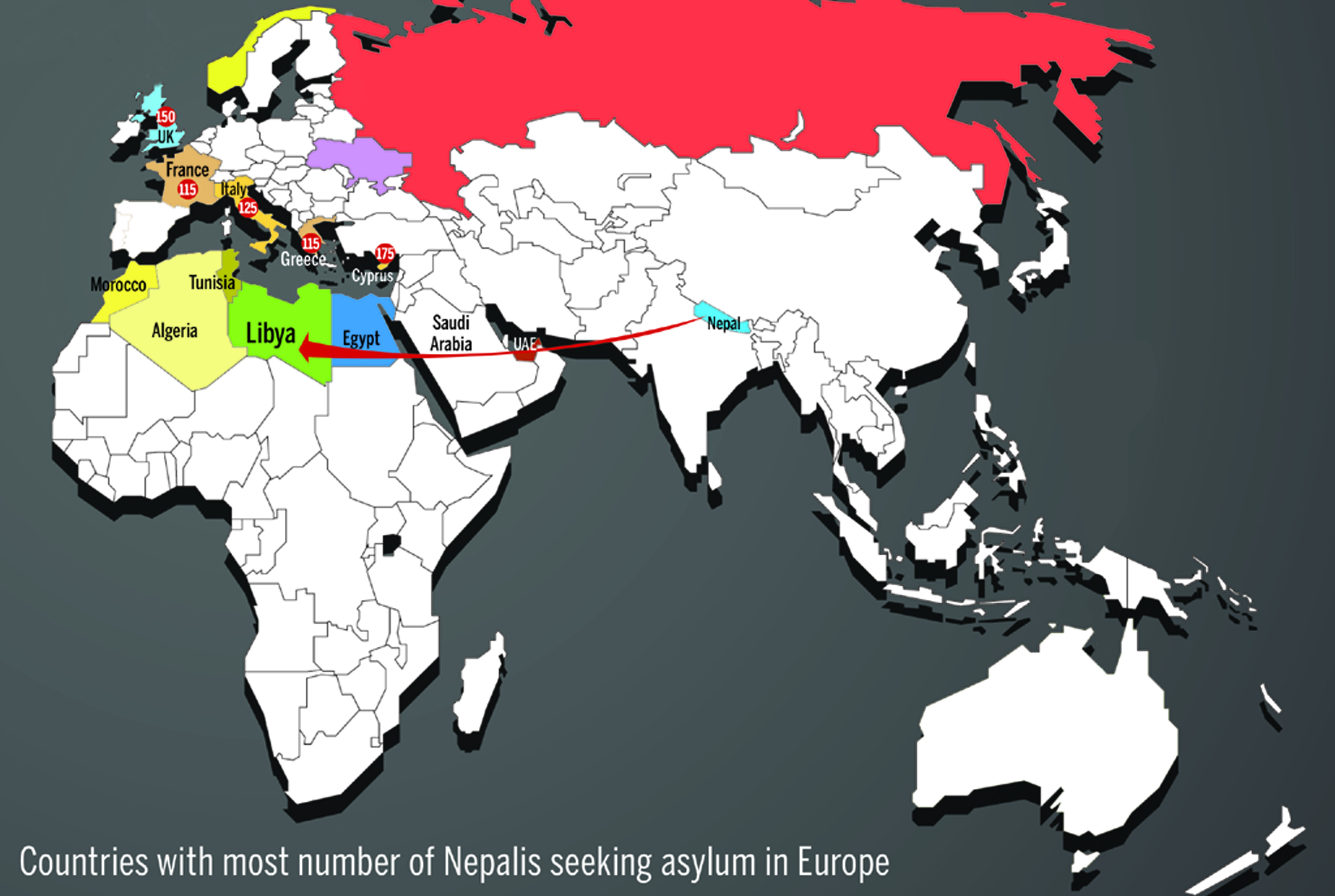
At the Nepali Embassy in Cairo, the phone doesn't stop ringing. The three-person team representing Nepal in Egypt sometimes spends an entire day answering distress calls from Nepalis scattered in 17 countries across the Middle East and Africa, all of which fall under the Cairo embassy’s jurisdiction. When the landlines stop ringing, their cell phones continue to buzz.
Sujan Bidari, deputy chief of mission at the embassy, says they have lately been swamped with requests for help from Nepalis, mostly young men, who were lured by human traffickers promising to take them to Europe but ended up stranded in countries like Libya, Algeria and Morocco.
“We tell them not to panic and that we are there to help,” Bidari told the Post in a phone interview.
Most Nepalis stranded in these places use messaging services like Whatsapp or Imo to contact embassy officials, but it isn’t easy sending help since Nepal has a limited diplomatic presence in this region. It takes weeks, sometimes months, for the embassy in Cairo to secure their return with all the necessary paperwork.
“First, we send them travel documents since most of them don’t have their passports—some are taken away by employers, others are thrown away to prevent deportation,” said Bidari. “Then we plan their return.”
According to Bidari, most Nepalis first enter Dubai or Oman on tourist visas, after which traffickers fly them to countries surrounding the Mediterranean, like Algeria, Libya, and Tunisia, which are closest to Europe.
In the last three months, the embassy, with assistance from IOM, has helped 34 Nepalis return home. The largest rescue they were able to do was earlier this year, when 15 Nepalis working in two companies in Libya were sent home after they complained of poor pay and arduous working conditions. Nepalis, who are forced to find work after being unable to cross the sea, end up as construction workers or drivers, Bidari said.
But as security situations in places like Libya get more fraught, arranging help for Nepalis stranded there has become more difficult. As of this week, four more Nepalis in Tripoli are awaiting return.
“The security and living situation in Libya remains very challenging as clashes continue to intensify,” said Safa Msehli, who works at IOM Libya’s Public Information Unit. “Conditions in detention centres are unacceptable and alternative solutions must be found.”
The limited information flow from Libya to the embassy in Cairo, because of the ensuing chaos in the country, has also delayed the return of several Nepalis stranded in the country. Bidari says the presence of Nepal Army soldiers in the UN Peacekeeping Force stationed in Libya, though, has helped them expedite some of their cases.
“Libya is mired in conflict so government agencies, and even the police, take longer to respond to our correspondence,” he said. “There are days when no one picks up the phone at the police station.”
Santosh Shrestha’s case is particularly challenging for Bidari and his team because this is the first time they are having to make arrangements to repatriate a dead body from a country mired in a civil war. Since being informed by IOM about Shrestha’s death on July 3, embassy officials in Cairo have been working closely with international organisations based in Libya, like the IOM, to get the necessary papers required to fly the body across international borders.
“We are not sure if the IOM will pay to transport the body to Nepal, like it has with other returnees in the past,” said Bidari. “I think the deceased’s family and the Nepal government will have to make arrangements.”
Back in Lamjung, Shrestha’s death has shattered his family. Som Prasad, the father, bitterly regrets being unable to convince his son to stay back.
“I told him not to leave, but he couldn’t resist the temptation to earn a lot of money,” said Som Prasad. “He wanted to pay off all our debts and take care of us.”
What do you think?
Dear reader, we’d like to hear from you. We regularly publish letters to the editor on contemporary issues or direct responses to something the Post has recently published. Please send your letters to [email protected] with "Letter to the Editor" in the subject line. Please include your name, location, and a contact address so one of our editors can reach out to you.




 16.12°C Kathmandu
16.12°C Kathmandu

